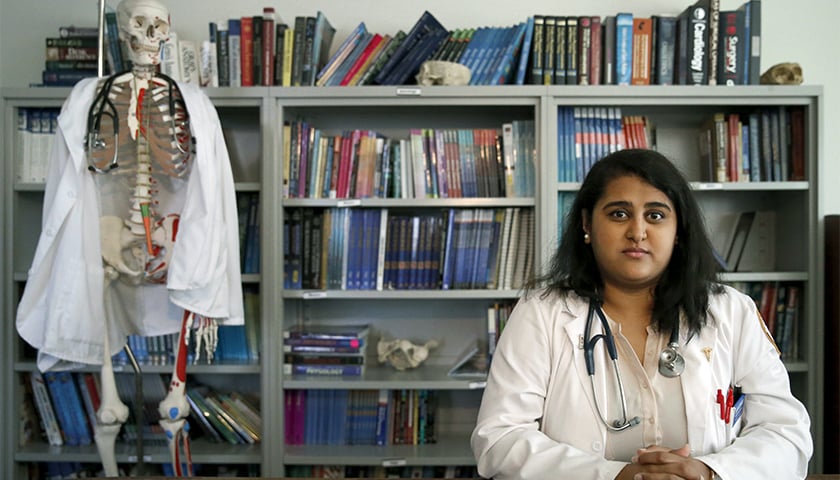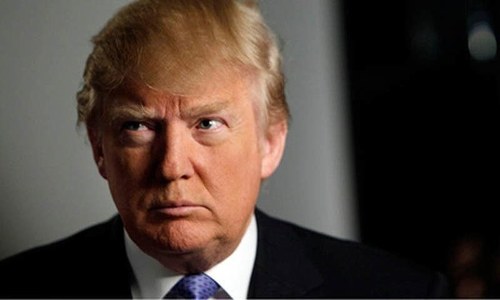Medical student Alejandra Duran Arreola dreams of becoming an OB-GYN (obstetrician-gynecologist) in her home state of Georgia, where there's a shortage of doctors and one of the highest maternal mortality rates in the United States (US).
But the 26-year-old Mexican immigrant's goal is now trapped in the debate over a programme protecting hundreds of thousands of immigrants like her from deportation. Whether she becomes a doctor depends on whether Congress finds an alternative to the Deferred Action for Childhood Arrivals (DACA) programme that US President Donald Trump phased out last month.
Arreola, who was brought to the US illegally at age 14, is among about 100 medical students nationwide who are enrolled in DACA and many have become a powerful voice in the immigration debate. Their stories have resonated with leaders in Washington. Having excelled in school and gained admission into competitive medical schools, they're on the verge of starting residencies to treat patients, a move experts say could help address the nation's worsening doctor shortage.
“It's mostly a tragedy of wasted talent and resources,” said Mark Kuczewski, who leads the medical education department at Loyola University's medical school, where Arreola is in her second year. “Our country will have said, 'You cannot go treat patients'.”
The Chicago-area medical school was the first to openly accept DACA students and has the largest concentration nationwide at 32. California and New York also have significant populations, according to the Association of American Medical Colleges.
DACA gives protection to about 800,000 immigrants who were brought to the US as children and who otherwise would lack legal permission to be in the country. The immigrants must meet strict criteria to receive two-year permits that shield them from deportation and allow them to work.
Then-President Barack Obama created DACA in 2012. Critics call it an illegal amnesty programme that is taking jobs from US citizens. In rescinding it last month, Trump gave lawmakers until March to come up with a replacement.
Public support for DACA is wide. A recent poll by The Associated Press-NORC Center for Public Affairs Research showed that just one in five Americans want to deport DACA recipients.
Medical students such as Arreola are trying to shape the debate, and they have the backing of influential medical groups, including the American Medical Association.
Arreola took a break from her studies last month to travel to Washington with fellow Loyola medical student and DACA recipient Cesar Montolongo Hernandez to talk to stakeholders. In their meetings with lawmakers, they framed the programme as a medical necessity but also want a solution for others with DACA.
A 2017 report by the Association of American Medical Colleges predicts a shortfall of between about 35,000 and 83,000 doctors in 2025. That shortage is expected to increase with population growth and ageing.
Hernandez, a 28-year-old from Mexico simultaneously pursuing a PhD, wants to focus his research on early detection of diseases. His work permit expires next September, and he's worried he won't qualify for scientific research funding without the programme.
“I've shown I deserve to be here,” said Hernandez, who met with Illinois Sen Dick Durbin, a Democrat who's called for Congress to quickly pass a replacement for DACA.
For Arreola it's about returning to the state she's called home since she was 14 and giving back to areas in need of doctors.
“My family is from there; I know those people,” Arreola said. “Those are the people that inspired to really give this a push.”
Among those Arreola met with were policy staff for Georgia Republican Sen Johnny Isakson, who believes the Obama programme was “an overreach of executive power” but also wants Congress to write a plan to protect DACA recipients.
Medical school administrators say the immigrant students stand out even among their accomplished peers: They're often bilingual and bi-cultural, have overcome adversity and are more likely to work with under-served populations or rural areas.
“They come with a cultural competency for how to best treat the individuals from their background, whether immigrants or different races and ethnicities,” said Matthew Shick, a government relations director for the Association of American Medical Colleges. “That gets translated over to their peers in education and training.”
Zarna Patel, 24, is a third-year student at Loyola who was brought to the US from India as a 3-year-old without any legal documents. Her DACA permit expires in January, and she's trying to renew it so she can continue medical school rotations that require clinical work. If she's able to work in US, Patel will work in disadvantaged areas of Illinois for four years, part of her agreement to get school loans.
“Growing up, I didn't have insurance,” she said. “I knew what that felt like, being locked out of the whole system.”
For others, there's added worry of being stuck with debt they can't repay. Marcela Zhou, who was born in Mexico after her family moved there from China, is in her third year at the University of California at Los Angeles' medical school. She wants to work in public health.
“Can I even afford to finish medical school?” said Zhou, who was 12 when she came to the US on a visitor visa that eventually expired. “It's sort of hard sometimes to keep going.”














































